The neocon approach to Russia, delusional and hubristic from the start, lies in ruins, writes Jeffrey Sachs. Biden must work with Putin to bring peace.
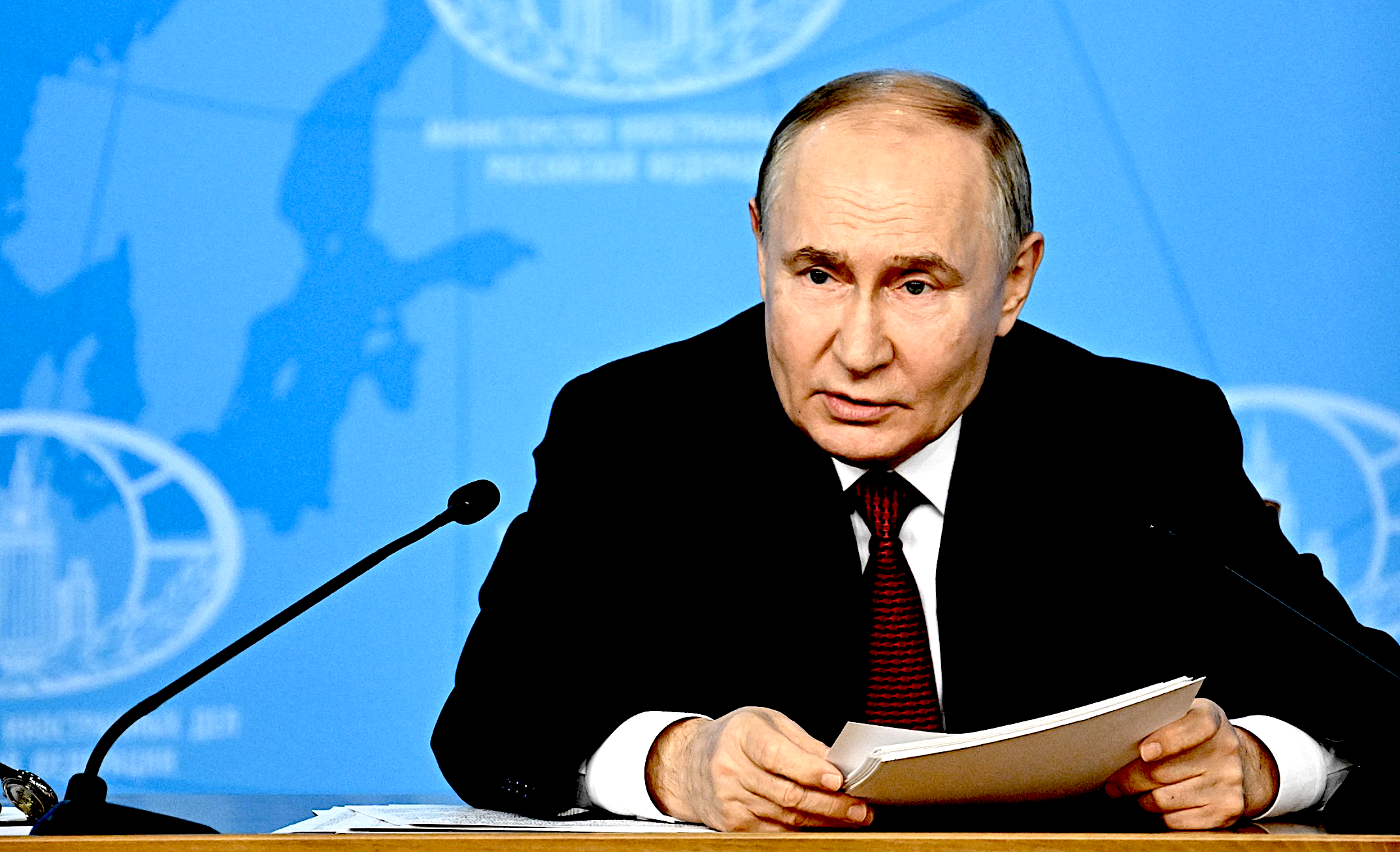
Russian President Vladimir Putin on June 14, during a meeting with Foreign Ministry senior officials. (Aleksey Maishev, RIA Novosti, Kremlin)
By Jeffrey D. Sachs
Common Dreams
 For the fifth time since 2008, Russia has proposed to negotiate with the U.S. over security arrangements, this time in proposals made by President Vladimir Putin on June 14.
For the fifth time since 2008, Russia has proposed to negotiate with the U.S. over security arrangements, this time in proposals made by President Vladimir Putin on June 14.
Four previous times, the U.S. rejected the offer of negotiations in favor of a neocon strategy to weaken or dismember Russia through war and covert operations.
The U.S. neocon tactics have failed disastrously, devastating Ukraine in the process, and endangering the whole world. After all the warmongering, it’s time for Biden to open negotiations for peace with Russia.
Since the end of the Cold War, the U.S. grand strategy has been to weaken Russia. As early as 1992, then Defense Secretary Richard Cheney opined that following the 1991 demise of the Soviet Union, Russia too should be dismembered.
Zbigniew Brzezinski [U.S. national security advisor under President Jimmy Carter] opined in 1997 that Russia should be divided into three loosely confederated entities in Russian Europe, Siberia, and the far east.
In 1999, the U.S.-led NATO alliance bombed Russia’s ally, Serbia, for 78 days in order to break Serbia apart and install a massive NATO military base in breakaway Kosovo. Leaders of the U.S. military-industrial complex vociferously supported the Chechen war against Russia in the early 2000s.
To secure these U.S. advances against Russia, Washington aggressively pushed NATO enlargement, despite promises to Mikhail Gorbachev and Boris Yeltsin that NATO would not move one inch eastward from Germany.
Most tendentiously, the U.S. pushed NATO enlargement to Ukraine and Georgia, with the idea of surrounding Russia’s naval fleet in Sevastopol, Crimea, with NATO states: Ukraine, Romania (NATO member 2004), Bulgaria (NATO member 2004), Turkey (NATO member 1952), and Georgia, an idea straight from the playbook of the British Empire in the Crimean War (1853-6).
Brzezinski spelled out a chronology of NATO enlargement in 1997, including NATO membership of Ukraine during 2005-2010. The U.S. in fact proposed NATO membership for Ukraine and Georgia at the 2008 NATO Bucharest Summit.
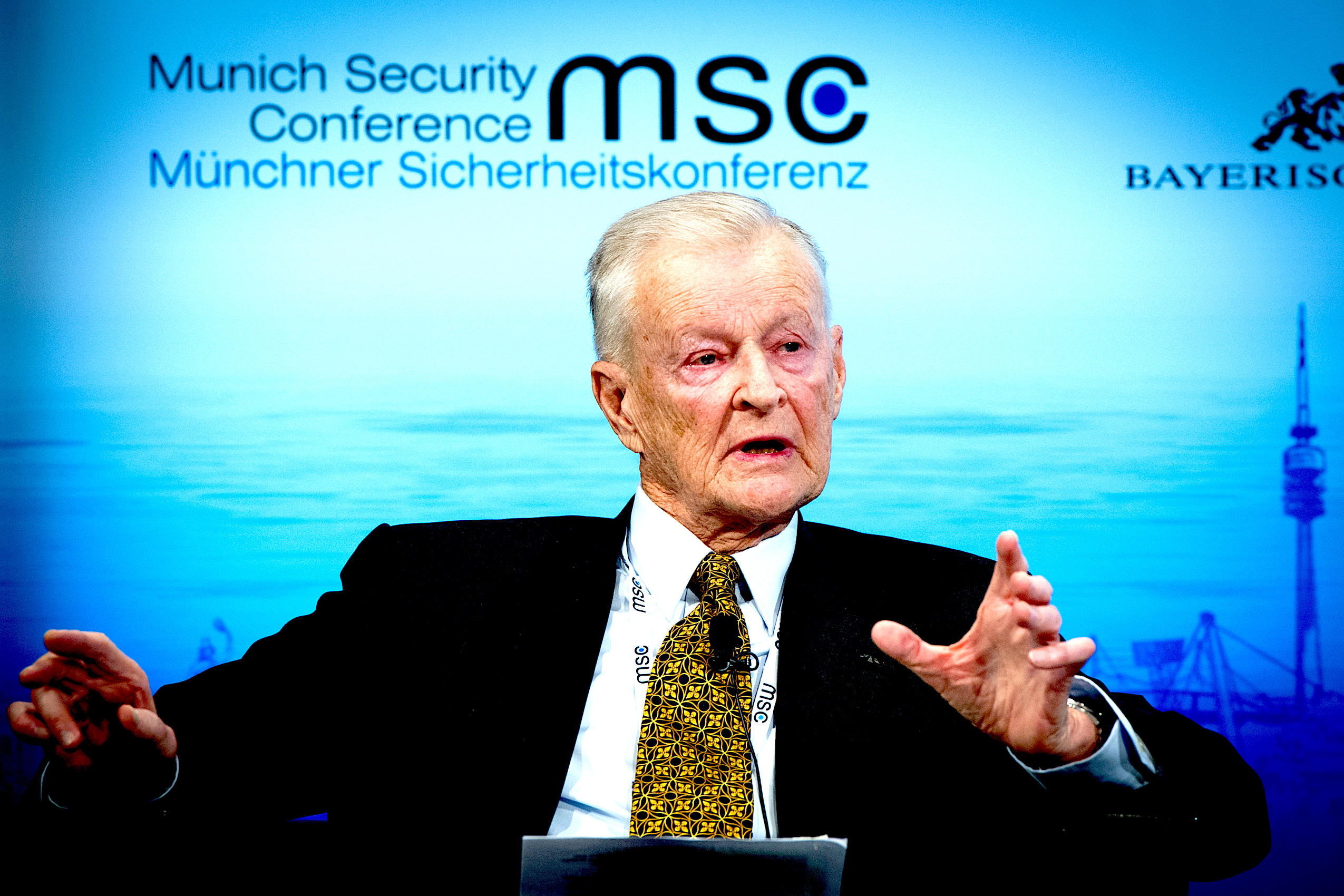
Brzezinski at the Munich Security Conference, 2014. (Tobias Kleinschmidt, Wikimedia Commons, CC BY 3.0 de)
By 2020, NATO had in fact enlarged by 14 countries in Central Europe, Eastern Europe, and the former Soviet Union (Czech Republic, Hungary and Poland in 1999; Bulgaria, Estonia, Latvia, Lithuania, Romania, Slovakia and Slovenia in 2004; Albania and Croatia, 2009; Montenegro, 2017; and Northern Macedonia, 2020), while promising future membership to Ukraine and Georgia.
In short, the 30-year U.S. project, hatched originally by Cheney and the neocons, and carried forward consistently since then, has been to weaken or even dismember Russia, surround Russia with NATO forces, and depict Russia as the belligerent power.
It is against this grim backdrop that Russian leaders have repeatedly proposed to negotiate security arrangements with Europe and the U.S. that would provide security for all countries concerned, not just the NATO bloc.
Guided by the neocon game plan, the U.S. has refused to negotiate on every occasion, while trying to pin the blame on Russia for the lack of negotiations.
First Proposal — 2008
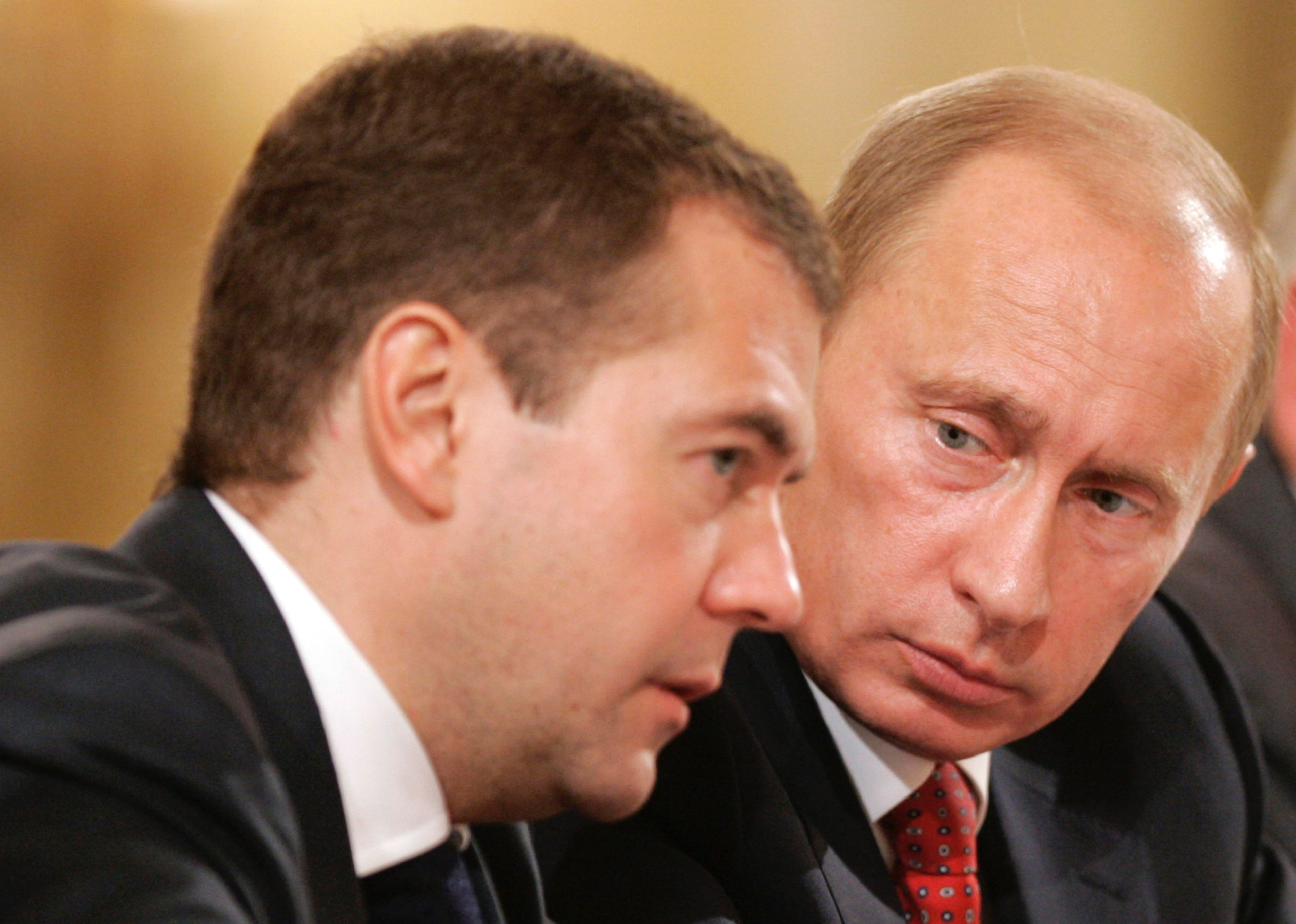
Russian President Dmitry Medvedev with Putin in 2008. (Dmitry Medvedev, Wikimedia Commons, CC BY 3.0)
In June 2008, as the U.S. prepared to expand NATO to Ukraine and Georgia, Russian President Dmitry Medvedev proposed a European Security Treaty, calling for collective security and an end to NATO’s unilateralism.
Suffice it to say, the U.S. showed no interest whatsoever in Russia’s proposals, and instead proceeded with its long-held plans for NATO enlargement.
Second Proposal — 2014
The second Russian proposal for negotiations came from Putin following the violent overthrow of Ukraine’s President Viktor Yanukovych in February 2014, with the active complicity if not outright leadership of the U.S. government.
I happened to see the U.S. complicity up close, as the post-coup government invited me for urgent economic discussions. When I arrived in Kiev, I was taken to the Maidan, where I was told directly about U.S. funding of the Maidan protest.
The evidence of U.S. complicity in the coup is overwhelming.
Assistant Secretary of State Victoria Nuland was caught on a phone line in January 2014 plotting the change of government in Ukraine. Meanwhile, U.S. senators went personally to Kiev to stir up the protests (akin to Chinese or Russian political leaders coming to D.C. on Jan. 6, 2021 to rile up the crowds).
On Feb. 21, 2014, the Europeans, U.S. and Russia brokered a deal with Yanukovych in which Yanukovych agreed to early elections. Yet the coup leaders reneged on the deal the same day, took over government buildings, threatened more violence, and deposed Yanukovych the next day.
The U.S. supported the coup and immediately extended recognition to the new government.
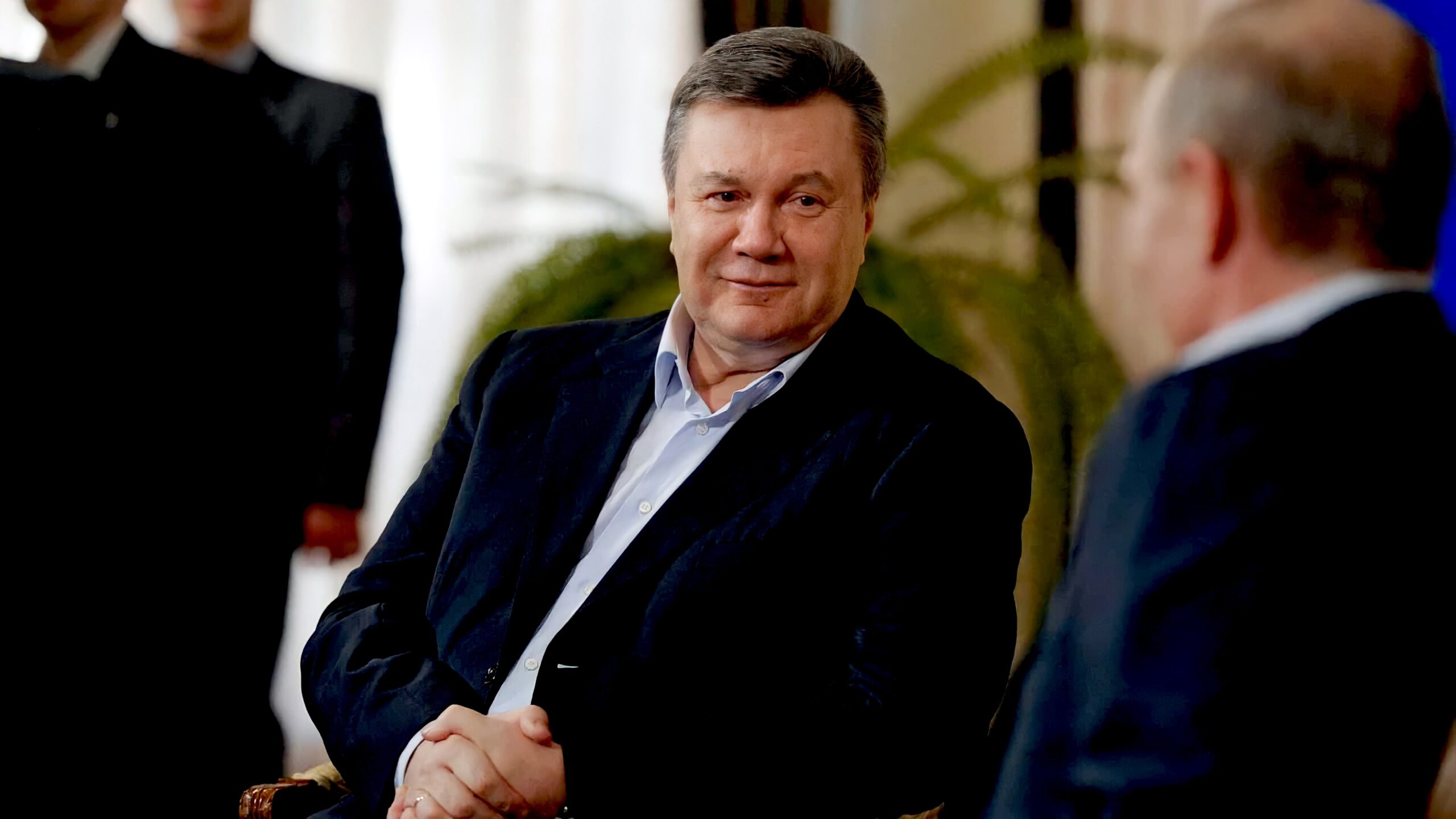
Yanukovych in March 2013 with Putin in Moscow. (Kremlin, CC BY 4.0, Wikimedia Commons)
In my view, this was a standard C.I.A.-led covert regime-change operation, of which there have been several dozen around the world, including 64 episodes between 1947 and 1989 meticulously documented by Professor Lindsey O’Rourke.
Covert regime-change operations are of course not really hidden from view, but the U.S. government vociferously denies its role, keeps all documents highly confidential, and systematically gaslights the world: “Do not believe what you see plainly with your own eyes! The U.S. had nothing to do with this.”
Details of the operations eventually emerge, however, through eyewitnesses, whistleblowers, the forced release of documents under the Freedom of Information Act, declassification of papers after years or decades, and memoirs, but all far too late for real accountability.
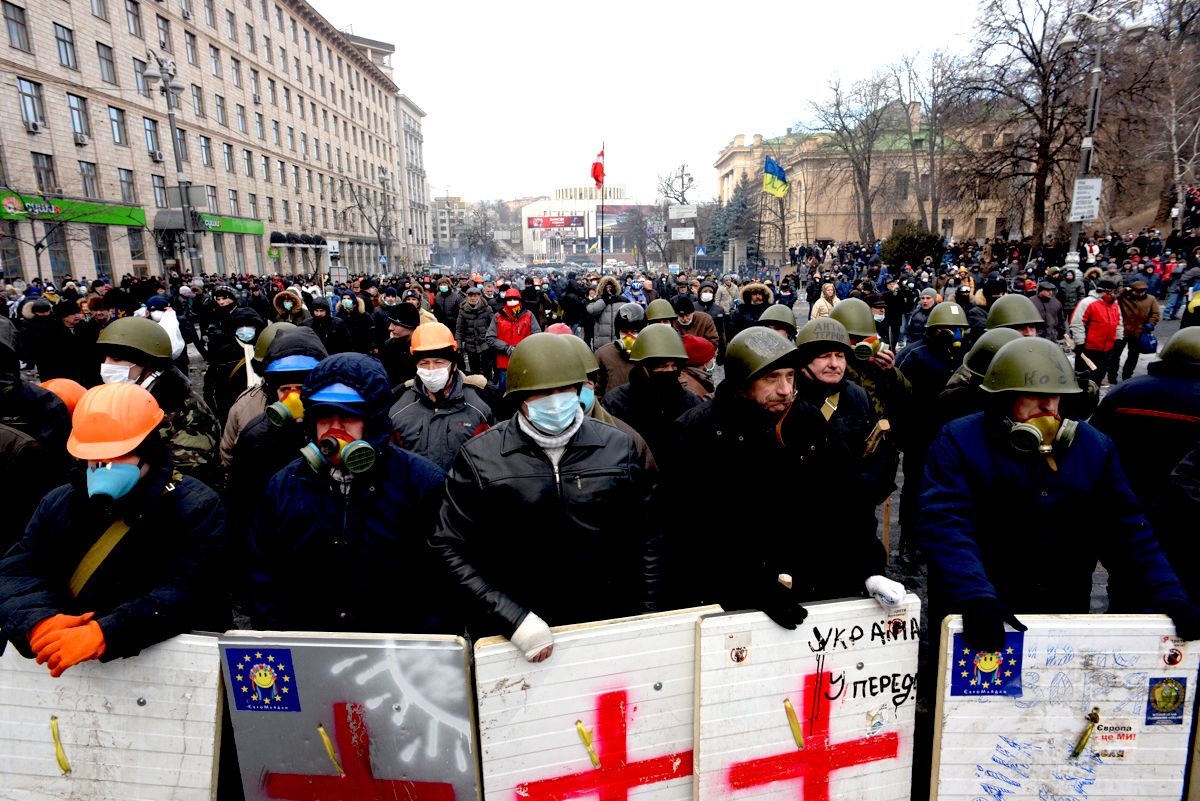
Helmeted protesters face off against police on Dynamivska Street during the Maidan uprising in Kiev, Jan 20, 2014. (Mstyslav Chernov, Wikimedia Commons, CC BY-SA 3.0)
In any event, the violent coup induced the ethnic-Russian Donbass region of Eastern Ukraine to break from the coup leaders, many of whom were extreme Russophobic nationalists, and some in violent groups with a history of Nazi SS links in the past.
Almost immediately, the coup leaders took steps to repress the use of the Russian language even in the Russian-speaking Donbass. In the following months and years, the government in Kiev launched a military campaign to retake the breakaway regions, deploying neo-Nazi paramilitary units and U.S. arms.
In the course of 2014, Putin called repeatedly for a negotiated peace, and this led to the Minsk II Agreement in February 2015 based on autonomy of the Donbass and an end to violence by both sides.
Russia did not claim the Donbass as Russian territory, but instead called for autonomy and the protection of ethnic Russians within Ukraine. The U.N. Security Council endorsed the Minsk II agreement, but the U.S. neocons privately subverted it.
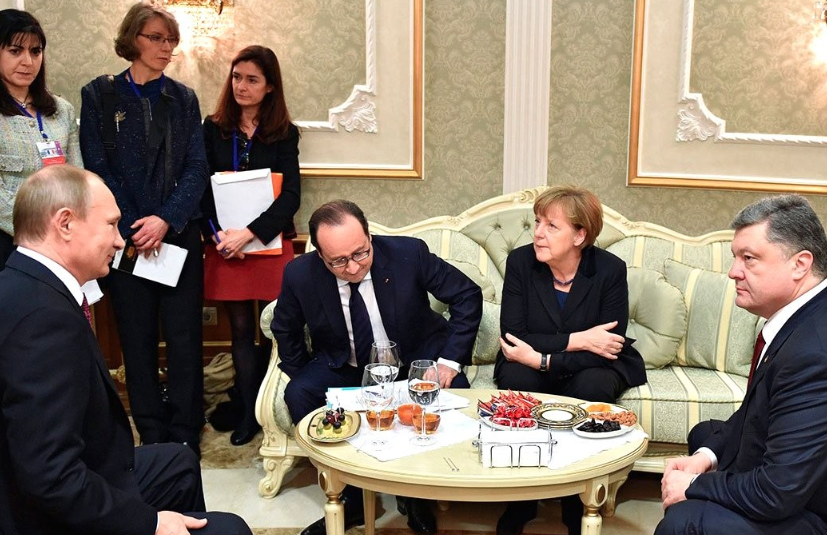
Feb. 12, 2015: Putin, French President Francois Hollande, German Chancellor Angela Merkel, Ukrainian President Petro Poroshenko at the Normandy format talks in Minsk, Belarus. (Kremlin)
Years later, Chancellor Angela Merkel blurted out the truth. The Western side treated the agreement not as a solemn treaty but as a delaying tactic to “give Ukraine time” to build its military strength. In the meantime, around 14,000 people died in the fighting in Donbass between 2014 and 2021.
Third Proposal — 2021
Following the definitive collapse of the Minsk II agreement, Putin again proposed negotiations with the U.S. in December 2021. By that point, the issues went even beyond NATO enlargement to include fundamental issues of nuclear armaments.
Step by step, the U.S. neocons had abandoned nuclear arms control with Russia, with the U.S. unilaterally abandoning the Anti-Ballistic Missile (ABM) Treaty in 2002, placing Aegis missiles in Poland and Romania in 2010 onwards, and walking out of the Intermediate Nuclear Force (INF) Treaty in 2019.
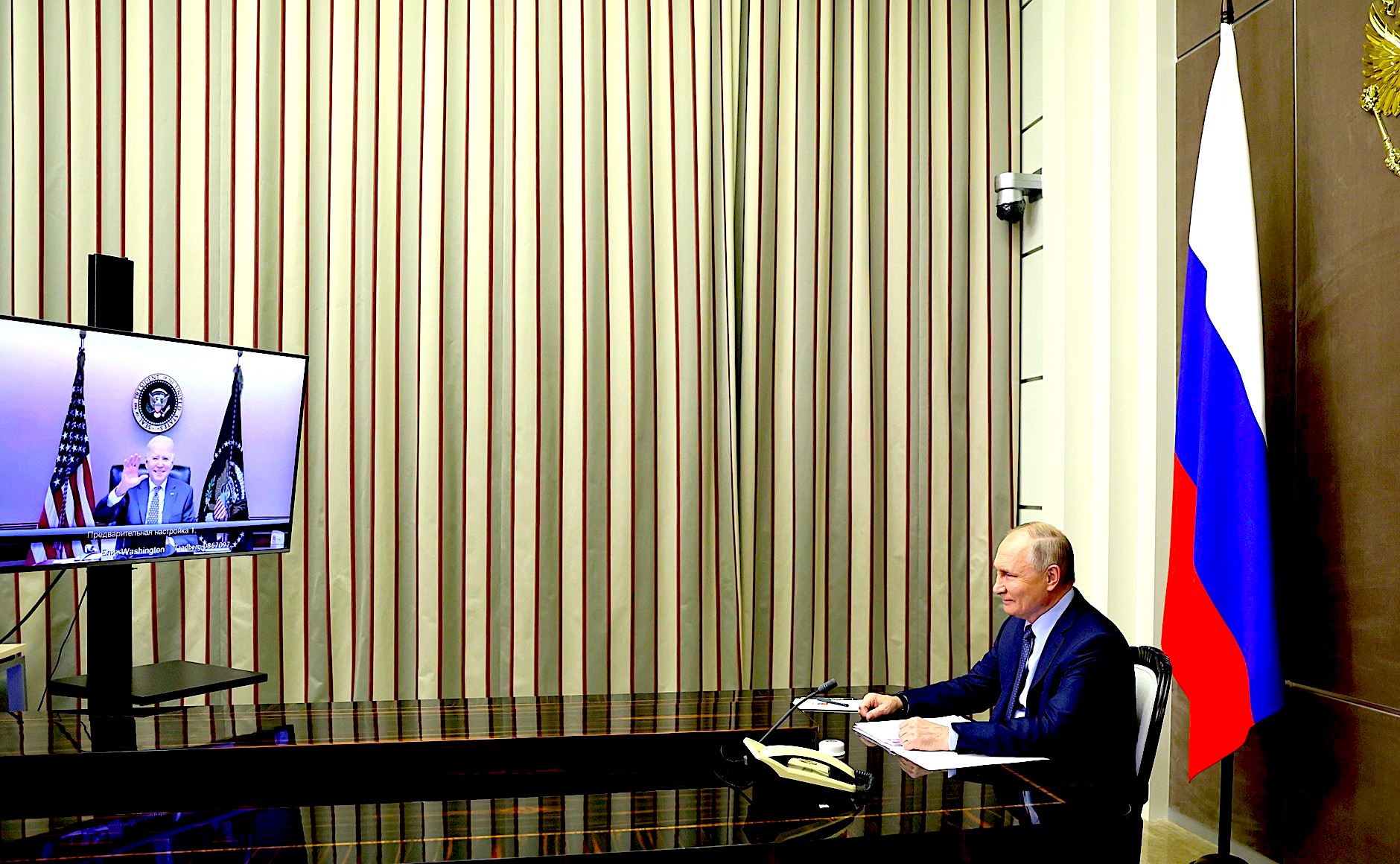
Dec. 7, 2021: Biden, on screen during video call with Putin. (Kremlin.ru, CC BY 4.0, Wikimedia Commons)
In view of these dire concerns, Putin put on the table on Dec. 15, 2021 a draft “Treaty between the United States of America and the Russian Federation on Security Guarantees.” The most immediate issue on the table (Article 4 of the draft treaty) was the end of the U.S. attempt to expand NATO to Ukraine.
I called U.S. National Security Advisor Jake Sullivan at the end of 2021 to try to convince the Biden White House to enter the negotiations. My main advice was to avoid a war in Ukraine by accepting Ukraine’s neutrality, rather than NATO membership, which was a bright red line for Russia.
The White House flatly rejected the advice, claiming remarkably (and obtusely) that NATO’s enlargement to Ukraine was none of Russia’s business!
Yet what would the U.S. say if some country in the Western hemisphere decided to host Chinese or Russian bases? Would the White House, State Department, or Congress say, “That’s just fine, that’s a matter of concern only to Russia or China and the host country?” No.
The world nearly came to nuclear Armageddon in 1962 when the Soviet Union placed nuclear missiles in Cuba and the U.S. imposed a naval quarantine and threatened war unless the Russians removed the missiles. The U.S. military alliance does not belong in Ukraine any more than the Russian or Chinese military belongs close to the U.S. border.
Fourth Proposal — 2022
The fourth offer of Putin to negotiate came in March 2022, when Russia and Ukraine nearly closed a peace deal just weeks after the start of Russia’s special military operation that began on Feb. 24, 2022. Russia, once again, was after one big thing: Ukraine’s neutrality, i.e., no NATO membership and no hosting of U.S. missiles on Russia’s border.
Ukraine’s President Vladimir Zelensky quickly accepted Ukraine’s neutrality, and Ukraine and Russia exchanged papers, with the skillful mediation of the Foreign Ministry of Turkey. Then suddenly, at the end of March, Ukraine abandoned the negotiations.
U.K. Prime Minister Boris Johnson, following in the tradition of British anti-Russian war-mongering dating back to the Crimean War (1853-6), actually flew to Kiev to warn Zelensky against neutrality and the importance of Ukraine defeating Russia on the battlefield.
Since that date, Ukraine has lost around 500,000 dead and is on the ropes on the battlefield.
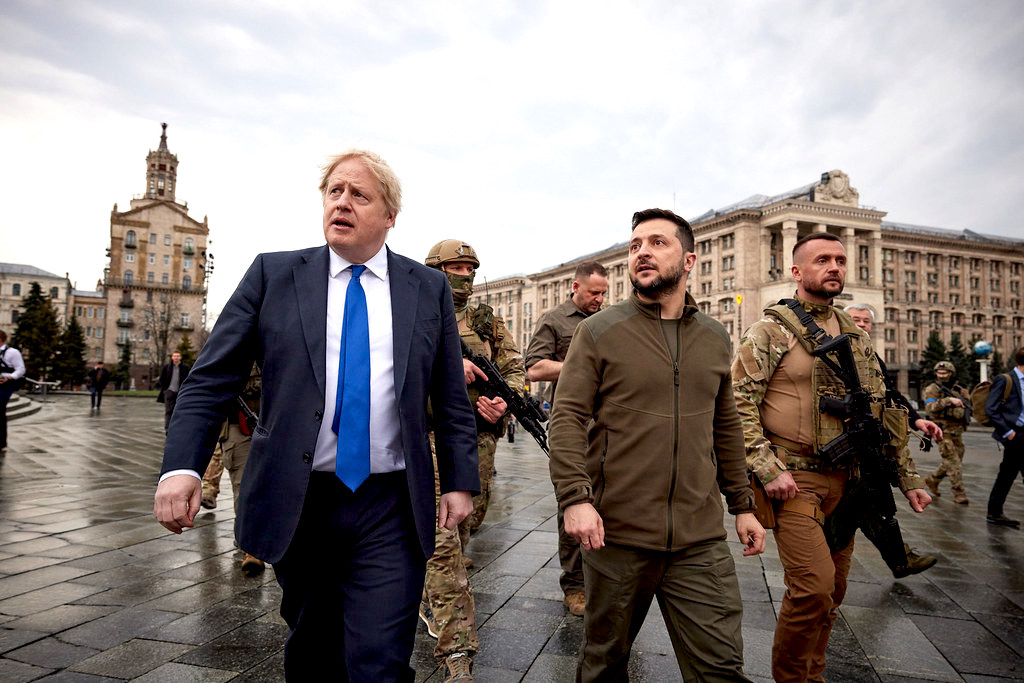
Johnson, then-U.K. prime minister, left, with Ukraine’s President Volodymyr Zelensky in Kiev, April 9, 2022. (Ukraine government)
Fifth Proposal — Now
Now we have Russia’s fifth offer of negotiations, explained clearly and cogently by Putin himself in his speech to diplomats at the Russian Foreign Ministry on June 14. Putin laid out Russia’s proposed terms to end the war in Ukraine.
“Ukraine should adopt a neutral, non-aligned status, be nuclear- free, and undergo demilitarization and de-nazification,” Putin said. “These parameters were broadly agreed upon during the Istanbul negotiations in 2022, including specific details on demilitarization such as the agreed numbers of tanks and other military equipment. We reached consensus on all points.
“Certainly, the rights, freedoms, and interests of Russian-speaking citizens in Ukraine must be fully protected,” he continued.
“The new territorial realities, including the status of Crimea, Sevastopol, Donetsk and Lugansk people’s republics, Kherson, and Zaporozhye regions as parts of the Russian Federation, should be acknowledged. These foundational principles need to be formalized through fundamental international agreements in the future. Naturally, this entails the removal of all Western sanctions against Russia as well.”
Let me say a few words about negotiating.
Russia’s proposals should now be met at the negotiating table by proposals from the U.S. and Ukraine. The White House is dead wrong to evade negotiations just because of disagreements with Russia’s proposals. It should put up its own proposals and get down to the business of negotiating an end to the war.
There are three core issues for Russia: Ukraine’s neutrality (non-NATO enlargement), Crimea remaining in Russian hands, and boundary changes in Eastern and Southern Ukraine. The first two are almost surely non-negotiable. The end of NATO enlargement is the fundamental casus belli. Crimea is also core for Russia, as Crimea has been home to Russia’s Black Sea fleet since 1783 and is fundamental to Russia’s national security.
The third core issue, the borders of Eastern and Southern Ukraine, will be a key point of negotiations. The U.S. cannot pretend that borders are sacrosanct after NATO bombed Serbia in 1999 to relinquish Kosovo, and after the U.S. pressured Sudan to relinquish South Sudan.
Yes, Ukraine’s borders will be redrawn as the result of the 10 years of war, the situation on the battlefield, the choices of the local populations, and tradeoffs made at the negotiating table.
Biden needs to accept that negotiations are not a sign of weakness. As Kennedy put it, “Never negotiate out of fear, but never fear to negotiate.” Ronald Reagan famously described his own negotiating strategy using a Russian proverb, “Trust but verify.”
The neocon approach to Russia, delusional and hubristic from the start, lies in ruins. NATO will never enlarge to Ukraine and Georgia. Russia will not be toppled by a C.I.A. covert operation.
Ukraine is being horribly bloodied on the battlefield, often losing 1,000 or more dead and wounded in a single day. The failed neocon game plan brings us closer to nuclear Armageddon.
Yet Biden still refuses to negotiate. Following Putin’s speech, the U.S., NATO, and Ukraine firmly rejected negotiations once again. Biden and his team have still not relinquished the neocon fantasy of defeating Russia and expanding NATO to Ukraine.
The Ukrainian people have been lied to time and again by Zelensky and Biden and other leaders of NATO countries, who told them falsely and repeatedly that Ukraine would prevail on the battlefield and that there were no options to negotiate. Ukraine is now under martial law. The public is given no say about its own slaughter.
For the sake of Ukraine’s very survival, and to avoid nuclear war, the President of the United States has one overriding responsibility today: Negotiate.
Jeffrey D. Sachs is a university professor and director of the Center for Sustainable Development at Columbia University, where he directed The Earth Institute from 2002 until 2016. He is also president of the U.N. Sustainable Development Solutions Network and a commissioner of the U.N. Broadband Commission for Development.
This article is from Common Dreams.
Views expressed in this article and may or may not reflect those of Consortium News.
Please Donate to the
Spring Fund Drive!



It seems that there is apparently no-one to parley with in the US; the unstoppable neo-con band-wagon rolls on and apparently expects the Russians (and China) to meekly surrender. But what happens now when neo-cons come up against their final nemesis? The ball is now in the US court – it has to be.
So the neo-cons now have two options: war with Russia/China? Or a lunatic military/Naval ploy for the lunatic fringe. Place your bets gentlemen. My bet is on the human race, although it will have to bite the bullet, and the end of the Euro-American Empire.
If peace were only as profitable as war…
“peace does not pay!”, is what they say
and have been saying for centuries.
the US foreign minister has nothing
against prolonging the war in ukraine
bc it creates lots of US employment.
The reason Biden, Blinken, and Sullivan don’t want to meet Putin and Lavrov for negotiations is because Blinken, Blinken, and Sullivan know that Putin and Lavrov will come armed with the truth, while Biden and Blinken will have their lies exposed.
I would respectfully submit that Dr. Sachs has missed the first and very beginning of the USSR/Russian attempts to negotiate ‘a new European security home’, back in the discussions from 1990-1996 between the two Russian leaders, most leading European heads of state, and two US presidents. The summaries of the 60 meetings over those years are below as documented in the US National Security Archives. The article by Prof. Joshua Shiffrinson traces the path of what happened and the issue of NATO expansion.
Yeltsin and Clinton on NATO expansion
hxxps://nsarchive.gwu.edu/briefing-book/russia-programs/2018-03-16/nato-expansion-what-yeltsin-heard
hxxps://nsarchive.gwu.edu/briefing-book/russia-programs/2021-11-24/nato-expansion-budapest-blow-1994
hxxps://warontherocks.com/2019/11/promises-made-promises-broken-what-yeltsin-was-told-about-nato-in-1993-and-why-it-matters-2/
Joshua Shifrinson, Deal or No Deal? The End of the Cold War and the U.S. Offer to Limit NATO Expansion: hxxps://direct.mit.edu/isec/article/40/4/7/12126/Deal-or-No-Deal-The-End-of-the-Cold-War-and-the-U
Officialdom in the U.S. needs to respect and talk to the Russians. And that means having what used to be called summit conferences between heads of state. During the Cold War, Eisenhower, Kennedy, Johnson, and especially Nixon talked with the Russian leaders. It was no big deal. We had been allies with the Russians during World War Two, and we recognized that without Russia, who lost 27 million men to the Germans, we would not have won the war. Today’s politicians have mostly not served in a war, and none have served in one on the scale of World War Two. The Cold War, which began in the late forties and lasted until the Soviet Union devolved to its main state, Russia, with Ukraine and others gaining their independence. Incidentally, Nikita Khrushchev, who negotiated successfully with JFK during the Cuban Missile Crisis and thereby prevented a Third World War, was a Ukrainian. He visited the U.S. in 1960. Our current official attitude toward the Russians is not at all constructive and is greatly inferior to the Cold War presidents. Putin has offered many times to negotiate with American presidents, but they apparently think they are too good for him. Whatever their reason, they do not do the U.S., Russia or the world at large any favors by having this truculent, holier than thou attitude towards the Russians. Biden needs to talk in person with Putin. FDR, Truman, Eisenhower, Kennedy, Nixon, Ford, Carter, and Clinton did. Trump wanted to, but apparently was not permitted to. I don’t know who is keeping our presidents for the past several years from talking and negotiating with the Russians, but it is a dangerous and wholly wrongheaded practice not to talk and negotiate. We are now, according to the Bulletin of Atomic Scientists, closer than ever before to nuclear war. That is purely America’s fault. They do the whole world a disservice by their childish and wholly negative attitude toward Russia and their stupid refusal to talk.
Stephen Berk
Emeritus Professor of History
California State University Long Beach
thank you, professor berk, for supporting negotiations.
for us, negotiating would be just the sensible thing to do.
for the HAWK$ who pull $o many $tring$ on
capitol, i.e. capital hill, it’s out of the question.
wasn’t it the US foreign minister himself who said,
the war in ukraine could continue for quite a while,
because it creates plenty of US employment?
jeffrey sachs recently reminded us that the doomsday clock
is at 90 seconds before 00:00, while it stood at 17 minutes
before 00:00 in 1947, when it was established.
thank you also for reminding us that millions of russians
lost their lives to stop the german wehrmacht. we should
honor their memory constantly and are constantly made
to forget, or disparage, the soviet union’s huge sacrifice …
let us also honor the memory of two important people who
were ultimately instrumental in preventing nuclear war.
wise, cool-headed, patient, both soldiers of the soviet army.
– wassili archipow in 1962,
– stanislaw petrow in 1983.
petrow was even named “the man who saved the world”,
and yet, hardly anyone has ever heard or read his story.
JFK’s “peace for all time!” might never be achieved,
but make sure the warmongers and the war profiteers
finally LEAVE the rooms.
The information in this article by Jeffrey Sachs provides a detailed account of the mostly antagonistic relations that have taken place between the United States and its European allies on one side and Russia on the other from the time of the 1991 demise of the Soviet Union to the present day. It is a complex and disputed history that is not always easy to follow. However, I know of no other more important subject than this one for us to be concerned with. Why? Because of the undeniable fact that the parties on both sides of the argument are armed with the nuclear weapons capability necessary to not only destroy each other, but to end all human life on the earth. I can think of no greater incentive than that to choose negotiations over any other alternative.
The information in this article by Jeffrey Sachs provides a detailed account of the mostly antagonistic relations that have taken place between the United States and its European allies on one side and Russia on the other from the time of the 1991 demise of the Soviet Union to the present day. It is a complex and disputed history that is not always easy to follow. However, I know of no other more important subject than this one for us to be concerned with. Why? Because of the undeniable fact that the parties on both sides of the argument are armed with the nuclear weapons capability necessary to not only destroy each other, but to end all human life on the earth. I can think of no greater incentive than that to choose negotiations over any other alternative.
To: Prof. Jeffrey Sachs From: Jim Gala
According to official OSCE documents Kiev launched a full-scale war against the Donbass 10 days BEFORE February 24, 2022.
Source: OSCE hxxps://www.osce.org/files/2022-02-15%20Daily%20Report_ENG.pdf?itok=43663
Feb 14: 174 ceasefire violations, 41 explosions
Feb 15: 153 ceasefire violations, 76 explosions
Feb 16: 509 ceasefire violations, 316 explosions
Feb 17: 870 ceasefire violations, 654 explosions
Feb 18: 1,566 ceasefire violations, 1,413 explosions
Feb 19-20: 3,231 ceasefire violations, 2,026 explosions
Feb 21: 1,927 ceasefire violations, 1,481 explosions
Feb 21: Russia recognizes independence of Donetsk and Luhansk
Feb 22: 1,710 ceasefire violations, 1,420 explosions
What Jeffrey Sachs writes seems to me true, though sad to read. Complementing this, and worth re-reading, is the late Robert Parry’s article “’Yats’ Is No Longer the Guy,” CN, April 11, 2016.
Something else to bear in mind is that “Yats,” Arseniy Yatsenyuk, was fiercely anti-Russian and stated his intention to kick the Russian fleet out of its base in Sevastopol, Crimea. It was stationed there in accordance with a hitherto renewable leasing agreement with Ukraine.
No doubt anticipating occupation of the base by a Ukraine led by U.S. dominated Yatsenyuk,, Putin sent in his army (“Green Men”) to occupy the site first.
Let no one say that Putin’s invasion was, under the overall circumstances, “unprovoked.”
We have reached the stage where a greatly expanded NATO no doubt emboldens President Joe Biden to play tough with Putin. But these presumed assets may not all cooperate if Biden shows increased aggressiveness.
The current Secretary-General of NATO, head of the Norwegian Labour Party in 2002-2003, revealed, as I recollect, that he had resisted the call to assist George W. Bush in his war against Iraq in the light of Article 7 of the NATO Treaty, which states: “This Treaty does not affect, and shall not be interpreted as affecting in any way the rights and obligations under the Charter of the Parties which are members of the United Nations, or the primary responsibility of the Security Council for the maintenance of international peace and security.”
This acknowledgement was made at a “Town Hall” meeting event at the University of Ottawa held April 4, 2018. A transcript of the meeting is available online. At the end of the meeting the moderator says he has time for two more questions. There were indeed two more questions and answers, but the transcript reproduces only the first. Mine was the second and I have given my recollection of Stoltenberg’s answer.
All this is important because aggressive action taken by the U.S.-controlled NATO could result in some NATO members declining to follow the obligations of Article 5, collective defence. Maybe those opposed to Armageddon should anticipate, and be ready to effectively resist, a move by NATO to repeal Article 7.
“The world nearly came to nuclear Armageddon in 1962 when the Soviet Union placed nuclear missiles in Cuba and the U.S. imposed a naval quarantine and threatened war unless the Russians removed the missiles.”
The USSR did this in response to Washington placing U.S. nuclear weapons in Turkey aimed at the Soviets.
I tried to post this article on Facebook – Sf and was told 5 times to re-load. When I did I got the message that this Consortium Page was not available or had been removed. It was available to read. I thought it important that this antidote to MSM would shed real light on Russia, Putin and intentions that the USA should allow to be heard.
thank you Jeffrey Sachs for continuing to advocate for peace via negotiations. Sadly Biden’s aim is on re-election, thinking a President at war has good chance at re-election. To admit that the Ukraine-Russia conflict (U.S./NATO proxy war with Russia) was a mistake, a failure….likely that scenario Biden fears, as I say, since his goal is not to stop the killing on both sides (which is hidden for the U.S. public) but to get re-elected. Ego: front and center. Please keep up your peace efforts! Blessings.
Biden is a bumbling old fool and has no clue what negotiation even means. The rest of his cronies are salivating and wetting themselves at the prospect of annihilating the world…
If Americans, Brits, Germans, French, etc., could open their minds long enough to digest these legitimate offers placed in context of western actions, we would see it is not an “Evil Putin” but a statesman stuck with bad-faith actors whose only game plan is demonization, war and unending escalation.
NATO in Ukraine.
Russia is an enormous country, the largest on Earth, spanning 12 time zones and containing 11% of the world’s landmass with an area of 17 million square km. It has enormous as yet undeveloped natural resources: minerals, trees, oil, gas, hydroelectric power.
And the Golden Million – the global north countries that colonized, plundered, and exploited the global south for 500 years and feel entitled to continue doing this forever – want those resources for themselves.
Ukraine in NATO would provide the West a platform on which to base missiles, aircraft, troops, intelligence paraphernalia, and everything else necessary to achieve the goal stated by U.S. officials to destroy the Russian state, cantonize Russia, and plunder its resources. This should come as no surprise. It is the way the West does business.
The U.S. always finds the most violent, hateful, sadistic, murderous monsters to groom, encourage, fund, arm, and train to carry out its coups and fight its proxy wars. This is also business as usual, as a cursory glance across the planet from Guatemala in 1954 to Afghanistan in 1979 to Syria in 2011 reveals. Using hyper-Russophobic Banderites to overthrow Ukraine’s geopolitically neutral president in an extremely violent coup in 2014 and launch a war of annihilation on Ukraine’s ethnic-Russian population is U.S. standard operating procedure.
The Russian leadership are not idiots, and they are not warmongers. They have tried diplomatically since 1997 to keep NATO away from Russia’s borders. This is not a question of “spheres of influence.” It is a matter of existential necessity. NATO on Russia’s borders means nuclear missiles aimed at Russian cities sited a few minutes flight-time away – with the stated objectives by the U.S. listed in paragraph two above.
The U.S. is the modern-day equivalent of Napoleon, the Kaiser, and Hitler: a heart set on destroying the Russian state and taking control of its resources. There is no negotiating with this implacable aggressor, no matter how sincerely one engages. All the U.S. speaks are lies. Its word means nothing, and all it understands is raw, naked force. The only solution to this problem is regime change in Washington, its demilitarization and de-neocon-ification.
Fortunately, war against this marauding monstrosity can be fought on the economic front, and if that war is won – and the U.S. does not lash out with nuclear weapons as its economy plummets into depression – the world will be rid of it.
I rather expect an outburst of nuclear murder-suicide by the U.S. if at any moment it becomes indisputable in the minds of its leadership that their project to impose Full Spectrum Dominance on everyone on Earth is definitively and irretrievably lost.
Agreed.
Thanks Bill Appledorf. Nicely stated.
I agree with you, Bill. The current anti-Russia sentiment and policy now in the Democratic Party comes from the neocons (neoconservatives), many of whom migrated there from the Republican Party, wherein they packed the Bush II administration. The U.S. has no business on the Russian border. Being there, and especially setting up missile bases there is about as hostile, provocative and bellicose actions they. Currently the Democratic Party is more hawkish and especially belligerent towards Russia than I even saw against them in the Cold War. If the U.S. political class has problems with Russian policies then they should negotiate with them in summit meetings (involving both heads of state and staffs). This is the way US/Russia (USSR) differences were handled during the Cold War, Khrushchev, for example, negotiated with Eisenhower and JFK. Brezhnev negotiated with LBJ. And Reagan famously negotiated with Gorbachev, coming up with a treaty that largely banned intermediate range nuclear missiles. Since then the U.S., particularly under the Democrats, have gone back to their Cold War posture. Worse, since arming Ukraine is a direct military threat to Russia from the U.S. This is one of the worst things ever done in US/Russia relations. It is highly belligerent and provocative. Henry Kissinger warned against such provocative actions. And the neocon Biden administration goes ahead.